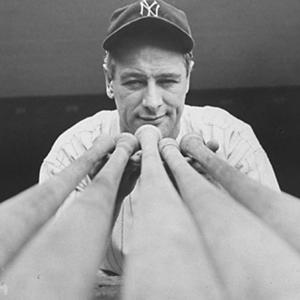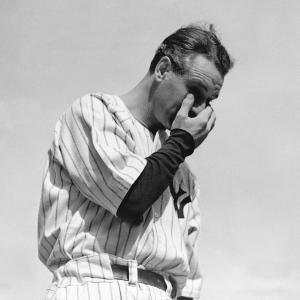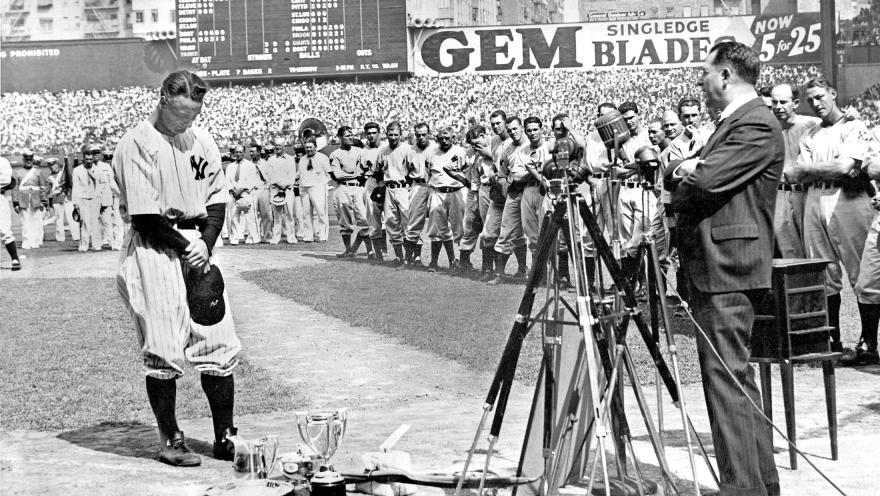It’s been 84 years since Lou Gehrig stood on the field at Yankee stadium and delivered his “Luckiest Man” speech before leaving the game he loved. But unless you were present in the Yankee Stadium on July 4, 1939, you’ve probably never heard it in its entirety.
The speech itself has become the stuff of legend, even though no complete recording, on film or audio, remains. Many people who believe they have seen or heard a complete version are in fact thinking of the fictionalized version from the film The Pride of the Yankees, which while similar in tone to the original, had been altered, shortened and simplified.
Here is what Gehrig actually said that day:
"For the past two weeks you have been reading about a bad break. Yet today, I consider myself the luckiest man on the face of the earth. I have been in ballparks for seventeen years and have never received anything but kindness and encouragement from you fans.
When you look around, wouldn’t you consider it a privilege to associate yourself with such fine-looking men as they’re standing in uniform in this ballpark today? Sure, I'm lucky. Who wouldn't consider it an honor to have known Jacob Ruppert?
Also, the builder of baseball's greatest empire, Ed Barrow? To have spent six years with that wonderful little fellow, Miller Huggins? Then to have spent the next nine years with that outstanding leader, that smart student of psychology, the best manager in baseball today, Joe McCarthy? Sure, I'm lucky.
When the New York Giants, a team you would give your right arm to beat, and vice versa, sends you a gift—that's something. When everybody down to the groundskeepers and those boys in white coats remember you with trophies—that's something.
When you have a wonderful mother-in-law who takes sides with you in squabbles with her own daughter—that's something. When you have a father and a mother who work all their lives so you can have an education and build your body—it's a blessing. When you have a wife who has been a tower of strength and shown more courage than you dreamed existed—that's the finest I know.
So I close in saying that I might have been given a bad break, but I’ve got an awful lot to live for.
Thank you."

The “bad break” Gehrig referred to was of course his ALS diagnosis. Gehrig had noted how tired he was during the second half of the 1938 season. “I don't know why, but I just couldn't get going again,” he said at the time. When he reported to spring training in 1939, his yet undiagnosed ALS had further weakened his muscles to the point where it was noticeable to everyone. However, Gehrig was in the midst of the longest consecutive games played streak in the history of baseball and remained in the starting lineup for the first month of the 1939 season.
He hit just .143 over that first month, shockingly below his career average of .340. And his once legendary power was gone, he had just one RBI and no home runs through April 30. After an off day on May 1, Gehrig approached his manager Joe McCarthy before the game in Detroit and said simply, "I'm benching myself, Joe.” He had appeared in 2,130 consecutive games but would not appear in another.
He arrived at the Mayo Clinic on June 13, and after six days of extensive testing, doctors confirmed the diagnosis of ALS on June 19, 1939, Gehrig's 36th birthday. Almost exactly two weeks later, he took the field in his uniform for the last time on July 4th for “Lou Gehrig Appreciation Day at Yankee Stadium," and delivered his now famous remarks at a ceremony between games of a doubleheader.

Gehrig’s speech has been called “baseball’s Gettysburg Address,” and the comparison seems fitting. For starters, Lincoln’s address ran just 272 words, and Gehrig’s impromptu remarks (by all accounts he had not prepared anything in advance and did not plan to address the crowd at all) ended up being just four words longer.
Both speeches also have a simple, genuine humanity that is perhaps more noticeable because of their brevity. And despite being forced to retire from the game he loved, Gehrig didn’t speak about baseball at all, but rather how lucky he was to have the support of those around him.
Gehrig would live less than two years after that afternoon, passing away at his home in the Bronx on June 2, 1941, by coincidence 16 years to the day from when he had replaced Wally Pipp at first base for the Yankees, beginning his streak of consecutive games played.
And while ALS took the life of this baseball legend far too soon, his legacy will forever live on in the hearts and minds of fans everywhere. In 2021, Major League Baseball announced the kick off of Lou Gehrig Day, an annual event to be held each year on June 2 celebrating his life and helping to raise awareness of what became known as Lou Gehrig’s Disease.
Special thanks to Major League Baseball and all 30 teams across the country for their commitment to helping create a world without ALS.
You can learn more about Lou Gehrig and the history of ALS HERE.
To continue to follow stories about people living with ALS in the community and learn more about the disease, subscribe to receive our weekly blogs in your inbox HERE or follow us at als.org/blog.


Join the conversation. Please comment below.